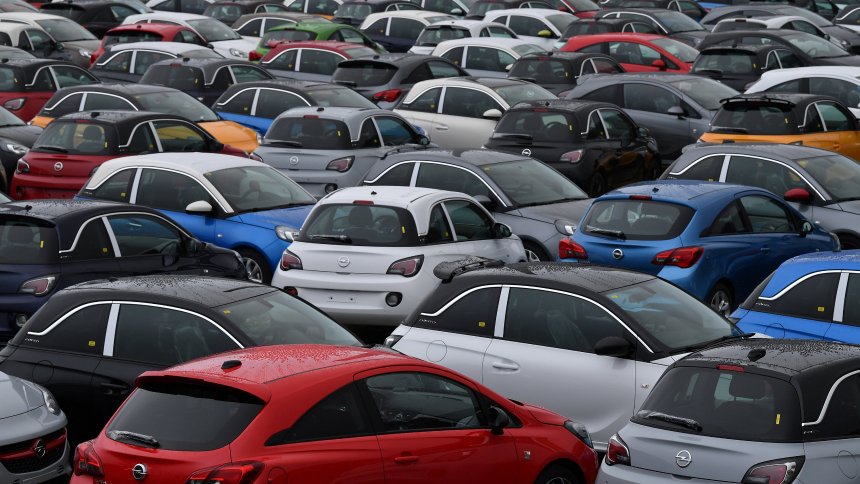The steering wheel can not be changed that fast: Even under the new owner PSA, the car manufacturer Opel is making heavy losses. Employees are wondering how hard the austerity program will be.
Opel plant in Eisenach
Monday, 26/02/2018
08:52 clock
How much will remain of Opel after the takeover by the French PSA Group left? Immediately before the PSA record this Thursday in Paris and the Geneva Motor Show, the answer to this anxious question is still pending. While the new Opel boss Michael Lohscheller in some of the scattered across Europe plants can show first remedial steps, in Germany, the talks with the works council and IG Metall falter. There is talk of a “clash of cultures” between German co-determination tradition and centralized French-style management Renovation of the brand with the flash is sluggish seven months after the acquisition.
Progress can be made by the former head of finance Lohscheller at the British Opel– Sister Vauxhall and in Spain show: In the poorly used Astra Ellesmere Port plant more than 600 people have to go, and for the largest European Opel plant in Zaragoza cuts in the cost structure were agreed to build there the newest Corsa. Over a period of five years, Spanish workers will forego higher wage increases, work more flexibly and lose part of their allowances.
The word “blueprint” they do not like to use in the Opel executive suite in this context, but the line given by PSA boss Carlos Tavares is clear: Invested only where the costs fall to a comparable level in the Group. “The status quo is not an option,” is the Opel mantra introduced by Tavares and now often repeated in Rüsselsheim. The labor costs in that of the old owner General Motors run-down companies must down and the revenue per vehicle up, otherwise Opel will not have a good future even under the new corporate roof. All this is to be achieved without dismissals and plant closures.
Negotiations small and halting
At the headquarters in Rüsselsheim the renovators are still far from being ready, after all it’s about an operation at the open heart of the long-established company. Management, works council and IG Metall have arranged a complex procedure in which they want to arrange the future especially of the development center with more than 7000 engineers. In the short term, the people have been sent in short time work, the elderly are testing offers to partial retirement and early retirement, Figures on the effectiveness of these instruments do not mention both sides. There are also no targets for how many heads the workforce with 38,000 people should shrink.
The situation in the German plants is not comparable with that in Zaragoza, says General Works Council leader Wolfgang Schäfer-Klug, who sees no reason for further concessions. He insists on valid collective bargaining agreements of IG Metall, which PSA has taken over and in which the workforce has already made almost 270 million euros savings by 2020. “The only one who did not deliver is the company, and management must finally come up with a plan.”
According to reports, the negotiations are small-scale and halting. How much of Opel remains, decides on the question, which tasks the Rüsselsheim engineers take over for the entire group. If they are limited to merely providing the basic PSA models with German styling elements, thousands of highly skilled jobs are about to end. Although Lohscheller and his head of development, Christian Müller, refer to core competencies that are in demand throughout the PSA Group. These included, for example, fuel cell technology or know-how, which should be taken into account when entering the US market. How many jobs would be secured in the end, but the managers say not.
Uncovered checks
Opel must reduce its annual costs by at least one billion euros, says auto expert Ferdinand Dudenhöffer of the University of Duisburg-Essen. The waiver of the Geneva Motor Show fits into the picture, but of course it’s just a splitter. Dudenhöffer sees greater potential in sales, which has so far been characterized by high discounts and far too many self-registrations. A glance at the German registration statistics shows that the current concept does not work. Although the overall market grew by double digits in January, Opel hardly sold a car in addition, the market share continued to decline.
Uncovered checks are currently being issued by Opel’s management for the Eisenach site, which has around 1,800 employees. Lohscheller has agreed to set up a new production line for the PSA platform EMP-2 in the Thuringian plant, which will also enable an electric version of the planned off-road vehicle. Which model that should be, is not known. However, the Opel SUV Grand Land, which is based on this platform, is already being built at Sochaux’s largest PSA plant.
Supervisory Board member Jochen Homburg of the IG Metall therefore sees the previous commitments skeptical: “We would like it a bit more concrete, even with quantities.” Especially as the management is silent about how long still running at GM developed lifestyle small car Adam in Eisenach off the line. The only thing that is clear is that the Opel vehicles with GM genes have no future in the PSA Group because of low margins and high licensing costs. Incidentally, this also applies to the top model Insignia, which was launched in 2017 and manufactured in Rüsselsheim.
Dudenhoeffer sees the component factory Kaiserslautern in an even more difficult situation, because it is internally in a tough cost competition with Vienna-Aspern and the already refurbished PSA plants. “In addition, combustion engines and transmissions are not the big business of tomorrow,” says the Duisburg auto professor.

